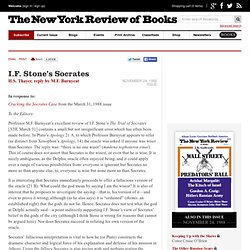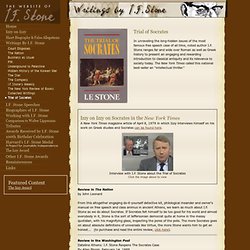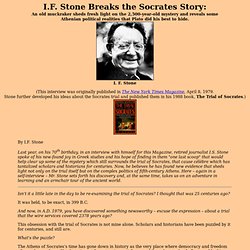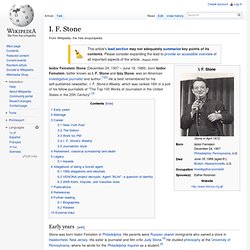

I.F. Stone’s Socrates. In response to: Cracking the Socrates Case from the March 31, 1988 issue To the Editors: Professor M.F.

Burnyeat’s excellent review of I.F. Stone’s The Trial of Socrates [NYR, March 31] contains a small but not insignificant error which has often been made before. It is interesting that Socrates immediately proceeds to offer a fallacious version of the oracle (21 B): What could the god mean by saying I am the wisest? Socrates’ fallacious interpretation is vital to how he (or Plato) constructs the dramatic character and logical force of his explanation and defense of his mission in Athens. Reading Log: The Trial of Socrates (I. F. Stone) The Official Website of I.F. Stone.
A New York Times magazine article of April 8, 1979 in which Izzy interviews himself on his work on Greek studies and Socrates can be found here.

Interview with I.F. Stone about the Trial of Socrates Click the image above to view Review in The Nation by John Leonard From this altogether engaging do-it-yourself detective kit, philological meander and owner's manual on free speech and class animus in ancient Athens, we learn as much about I.F. Stone as we do about Socrates.
Review in the Washington Post Dateline Athens: I.F. Actually, in spite of the journalistic pose, [Stone] is in Greece on a mission, having had a clear view of what he wants to do before he went. Reviewed by CHRISTOPHER LEHMANN-HAUPT The New York Times SOCRATES' drinking of the hemlock in 399 B.C. must surely be counted among the most dramatic acts of human history. Plato, who made Socrates the hero of his famous dialogues, seems to suggest his mentor got into trouble for exhorting his fellow citizens to virtue. I. F. Stone Interviewed aboout the Trial of Socrates. By I.F.

Stone Last year, on his 70th birthday, in an interview with himself for this Magazine, retired journalist I.S. Stone spoke of his new-found joy in Greek studies and his hope of finding in them "one last scoop" that would help clear up some of the mystery which still surrounds the trial of Socrates, that cause célèbre which has tantalized scholars and historians for centuries. Now, he believes he has found new evidence that sheds light not only on the trial itself but on the complex politics of fifth-century Athens. Here – again in a self-interview – Mr. Isn’t it a little late in the day to be re-examining the trial of Socrates? It was held, to be exact, in 399 B.C. And now, in A.D. 1979, you have discovered something newsworthy – excuse the expression – about a trial that the wire services covered 2378 years ago? This obsession with the trial of Socrates is not mine alone. What’s the puzzle? Why should this fascinate an old Washington muckraker like you?
The Trial of Socrates: An Account. I. F. Stone. Isidor Feinstein Stone (December 24, 1907 – June 18, 1989), born Isidor Feinstein, better known as I.

F. Stone and Izzy Stone, was an American investigative journalist and author.[1][2] He is best remembered for his self-published newsletter, I. F. Stone's Weekly, which was ranked 16th in a poll of his fellow journalists of "The Top 100 Works of Journalism in the United States in the 20th Century".[3] Early years[edit] Marriage[edit] In 1929, he married Esther Roisman, who later served as his assistant at I. Career[edit] New York Post[edit] Stone moved to the New York Post in 1933 and during this period supported Franklin Roosevelt and the New Deal.
The Nation[edit] After leaving the New York Post in 1939, Stone became associate editor and then Washington editor of The Nation.[2] His next book, Business as Unusual (1941), was an attack on the country's failure to prepare for war. Work for PM[edit] They have been kicked around as Jews and now they want to live as Jews.